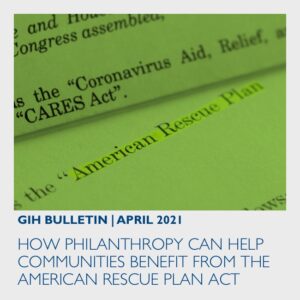Cara V. James, PhD, President and CEO, Grantmakers In Health
The past year has shed light on numerous flaws across our health, social, and economic systems, as well as our safety net, which is designed to support people in a time of crisis. Congress passed several stimulus packages, including the Coronavirus Aid, Relief, and Economic Security (CARES) Act; Families First Coronavirus Response Act (FFCRA); and a year-end COVID-19 relief and spending package. Recognizing the continued need for relief, Congress recently passed the American Rescue Plan Act of 2021 (ARPA) and is considering an infrastructure bill that would provide more resources to strengthen communities.
The American Rescue Plan Act provides $1.9 trillion in programs and tax policies across nearly all sectors of government to provide relief to individuals, families, communities, and states. A sample of some of the health items in ARPA include:
- $47.8 billion for COVID-19 testing and tracing activities;
- $7.6 billion for state, local, and territorial public health departments to establish, expand, and sustain their public health workforce;
- $800 million for the health workforce;
- $1.5 billion for Community Mental Health Services Block grant for 2021;
- $1.4 billion for programs under the Older Americans Act (including $750 million for nutrition programs for 2021);
- $1 billion for the Pandemic Emergency Fund, which provides one-time benefits such as cash and vouchers to eligible families with low incomes;
- $1 billion for grants for nutrition assistance programs in U.S. territories; and
- $8.5 billion for a newly established fund for rural providers.
The law also includes funding for education, transportation, housing, agriculture, and technology. It presents an opportunity to plug some of the gaps created by the pandemic and economic recession, and to fortify programs and services so they are stronger, and we are better prepared for the next crisis. The funding and program changes also present challenges. The resources provided can fill critical needs but are being distributed through systems that are already stretched and hence struggling to get existing resources into communities and to those most in need. Others have written about how the law can help achieve health equity. I would like to focus on how its implementation can also advance health equity and the significant role that philanthropy can play.
While some of the funding will flow automatically, some will require communities to apply for it. State and local governments are stretched thin for myriad reasons. Their ability to process and quickly distribute resources to communities and families will vary substantially and can lead to greater disparities. It is crucial to ensure that the allocations of money automatically flowing from states to communities take equity into account, and it will be important to make sure that underserved communities have the capacity to plan for, apply for, and manage the resources to best meet their needs.
What can philanthropy do? There are several ways in which philanthropy can help to minimize the risk that we squander this opportunity to strengthen our communities. One is to help communities through planning grants, technical assistance, and capacity building to identify their needs and determine how best to spend the resources provided through the relief packages. Philanthropy can also help state and local health departments—which have seen their staff diminish over the past year—to identify opportunities, connect with community groups, and distribute resources. For example, foundations can serve as intermediaries to help ensure resources reach the community in a timely manner. Foundations that have done this in the past, or are currently doing it include: Jewish Healthcare Foundation, Health Foundation of Greater Indianapolis, California Community Foundation, Community Foundation for Crawford County and Hawai’i Community Foundation. Finally, foundations can lend their talent to support federal and state agencies to support program implementation. The Intergovernmental Personnel Act Mobility Program allows certain organizations to temporarily provide talent to the federal government to help fill important needs.
As more U.S. residents receive COVID-19 vaccines, many of us are beginning to think about what comes next. While the primary purpose of the American Rescue Plan Act of 2021 is to provide immediate relief from the COVID-19 pandemic, the law also invites us to plan for the future. There is a risk that the stress and strain of the past year, combined with the current needs related to the ongoing pandemic—and lack of capacity at all levels to adequately plan for and manage these new resources—could lead communities being left out, greater inequities, and a missed opportunity to better prepared for the future. As it has done in the past, philanthropy can help to ensure this does not happen and that we do not squander this moment.

